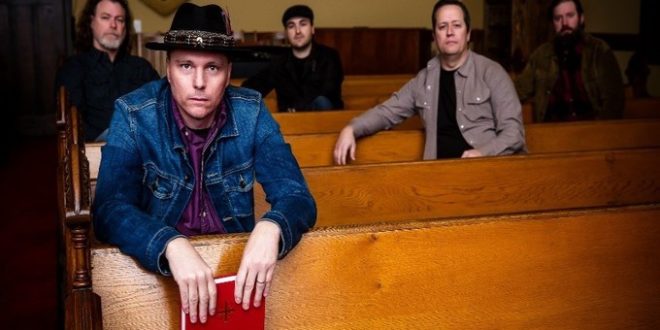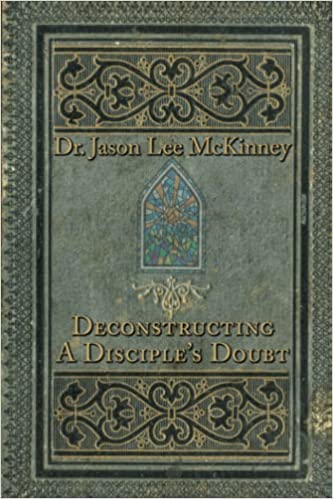In New Book, Dr. Jason McKinney Explores Constructs of Faith in a Deconstruction-Hungry World

Deconstructing faith. It is a term heard with increasing frequency across Christendom the last few years. Put simply, faith deconstruction is a phenomenon within American evangelicalism where Christians rethink their faith and get rid of previously held beliefs, sometimes to the point where their tenets of faith are barely recognizable.
The reasons are many, but advocates are quick to point to the healthy nature of deconstructing faith, likening it to pruning a tree, or the process of trimming away what is unnecessary for its long term vitality. Critics have rallied against the concept, calling it everything from a ‘veneer of intellectualism’ to a false religion.
For author Dr. Jason McKinney, the concept of deconstructing faith is the focal point of his latest book, Deconstructing a Disciple’s Doubt. Designed for doubting Thomases and denying Peters, this book is for people who ask far reaching questions like, what is truth? Or, why is attending church important when all that really matters is that I have a personal relationship with Jesus Christ?
I recently sat down with Dr. Mckinney, who is also the frontman of popular roots music group The Jason Lee McKinney Band, to discuss why the book is intended for both wonderers and wanderers alike, whether deconstruction is just a fad that will soon pass, and ponders whether it will have long term effects on people who doubt their doubt.
We hear so much these days about the term “deconstruction” in relation to faith. For the sake of our conversation, how would you define deconstruction within the context of your book?
In the context of my book, deconstruction basically means taking something that is assumed and putting it back on the table. And so, it’s not assuming any longer for that particular thing and instance to be true anymore. We all live with assumptions. We have to. I believe it’s philosopher Thomas Hobbes who said, “We don’t know the sun is going to rise tomorrow because at some point, whenever that will be, scientists can predict that it won’t.” There will be a day when it will not. But we have to live with that assumption. Otherwise we can’t function. So we live with these assumptions all the time, but deconstruction is just allowing yourself to put something back on the table to be reconsidered.
With that said, what was the inspiration or the catalyst for writing Deconstructing a Disciple’s Doubt?
For me, there were two sources of inspiration, and one was my own life. I’m not someone who faith comes easy for. I have to wrestle through it. I have to work for it. I have to chew on it. And I’ve struggled with a lot of doubt and deconstructions in my own life. I’ve come through them, and not that I think they’re final, I think that doubts can happen periodically through our lives. And then the other thing is, in addition to touring around (as a musician), I see a lot of young people touring around and playing as musicians. I’m also a college professor, and I just see so many young people who don’t know what a substantial undergirding is in the floor and cornerstone we have to stand on with our faith. They don’t know that our faith is quite reasonable, and we at least have equal footing with any other worldview.
Yet most young people I’m seeing coming to college that have faith, that have been raised in faith, just don’t know that they have something to stand on. And so, I wanted to take what has happened to me, the struggles I’ve had and write about them. My hope is that it would help somebody else, anybody else, to not have to struggle quite as much. I would like them to know and be confident that there are very good reasons for their faith.
You have an interesting background in that you are probably best known for your musical career, as an award-winning recording artist in American roots music. How does one go from musician to a doctorate in leadership to author?
I’m either a glutton for punishment or eternally curious. I tell people all the time that I’m not particularly intelligent. I don’t think I’m particularly driven, but I am curious. I am constantly wanting to learn more. And the other thing is a similarity between being a songwriter, being an academic, and studying philosophy. It’s that same thing, that eternal curiosity. Songwriters say, ‘I wonder if I took something that Prince did and combined it with a lyrical idea that I’m stealing from Rich Mullins, and I put them together. I wonder if that would be something innovative? There is that eternal curiosity about songwriting as well as being in philosophy or theology.
This book zeroes in on the life of Thomas (Doubting Thomas) and the petulant Peter. Why do their lives lay such critical groundwork for what people are facing today?
It definitely references them. I don’t know that it zeros in on them though. It probably zeros in on me. In ways, I’m similar to Thomas and Peter. I can also make these brash, “I’m going to do it all for you, Lord, and there’s nothing going to stop me” type statements. And the next moment I’m denying and doubting. And so, I think there’s a similarity between myself and Peter and Thomas. I’m married to my wife, who is a marriage and family therapist. She’s one of those people that believes it’s all going to work out and God’s got it. And she’s right. But that’s just never been good enough for me. I would definitely be the guy who’d be like, “Can I touch the scar?” I’m seeing it, but I don’t know if it’s real.
Why do their lives lay such critical groundwork for what people are facing today?
Well, I think all of the disciples deconstructed from the worldview of what First Century Jews expected the Messiah to be. Jesus was anything but that. They expected some sort of a Maccabean military hero or political hero. And He was giving to Caesar what was Caesar’s. So, I don’t really care about politics. What He cared about was transforming souls, bringing God down to humanity and reconciling all of creation to Himself. And He was not the Messiah they wanted. He was the Messiah they needed, and they needed to deconstruct from the worldview. If you look at Peter, he goes from being a fisherman to denying, and then Jesus asking him three times, “Do you love me?” And then in Acts, Peter sort of starts at the very beginning. I can’t remember if it’s the end of Acts one or beginning of Acts 2. If you read the end and go to the beginning it’s there. He says, “This is the way it was always supposed to be.” And he basically recounts all of the story of the Old Testament and ties it into, now we’re here. This is what had to happen. That realization for him shows the sort of complete deconstruction of his previous worldview and is now getting it and becoming the rock upon which the church was built.
This seems to be a philosophy book for philosophers, philosophy students, and lay philosophers. Can the average reader get something out of this book?
I went to great links to make sure they (the average reader) could, And so, I weave in cosmology or the problem of evil. The language can get very technical. And to have the authenticity and to speak with any sort of precision, I knew that I had to use that technical language. But at the same time, I have a personal story in every chapter from my own life, which is written in a very colloquial and narrative form. I also use movie quotes that sort of demonstrate the worldview, everything from Marvel characters to Ted Lasso to Mr. Holland’s Opus . And then, on our new album, a lot of the songs weave in these philosophical concepts, and have QR codes in the lyrics. So, like a doubter’s prayers in there, cosmology is dealt with in the song “Freedom”. The problem of evil is dealt with within the song, “Sing On”. I go through and try to give these modern examples, whether it’s movies, songs, or anecdotal stories from my own life, as a way to sort of make these high level concepts make sense to anyone as they’re reading it. I also include definitions of all these crazy $5 words in each chapter.
As you have mentioned, I love how you insert dialogue from movie and TV scenes along with lyrics from songs to make some of the concepts you are presenting more relatable and digestible. However, as a result, some people might point to this book and call it pop philosophy. How do you respond to those folks?
I think that’s a fair criticism. It’s at least half pop philosophy. And I think in the opening line of the book, I say “fish wrap”. If you’re looking at true high level, top Harvard Cambridge philosophers, they’re going to look at this book that way. But I didn’t write it for them. I wrote the book so that the average person can realize philosophy didn’t give me my faith. A personal encounter with Jesus gave me my faith. But philosophy has talked me back into my faith more times than I can count. I’m a person that would wake up in the middle of the night asking myself, “Is this all just a bunch of crap?” And then I have to say, “Well, if the Big Bang’s there, what was before that?” There had to be something before that, and whatever was before that had to be there. And if it had to be there, I talked myself back into faith over and over and over again through philosophy. So, I didn’t really write the book for them.
What are some practical takeaways people can extract from Deconstructing a Disciple’s Doubt?
For the Christian, it’s that you’re not alone. It’s okay to doubt. It’s okay to deconstruct. That is a process that we’ll go through many times over and over. And I think for churches, it’s to be very patient with people that are deconstructing. I think one of the challenges that I present in the book is that when we deconstruct from an entire worldview, we don’t look nearly as critically at the worldview we’re moving towards as the one we’re moving away from. I provide the challenge to make sure you’re looking just as critically at what you’re moving towards, rather than what you’re just moving away from. The other thing I think I bring into this is more for atheists than that sort of non-believers. There are two things. They are, one, I want them to walk away going, ‘Man, I do think those Christians have reason to believe what they do. I respect it.’ And then the second thing is, it’s often put towards people of religion or people of faith that we are indoctrinated. And I definitely put forth that everyone is indoctrinated. If you and your spouse have ever had an argument about which way the toilet paper goes, you’re indoctrinated. When you have that assumption of there’s one right way to roll the toothpaste, you’re indoctrinated in that we’re all indoctrinated. You can only choose what you’re indoctrinated by.
After people have read Deconstructing a Disciple’s Doubt, as an author what would you like your audience to get out of the experience? What is your greatest hope for the book?
I would love to see Christians come out with sort of a Hegelian dialectic where you have a thesis. You have a way that you view the world, something comes against it that rubs against it. And then, if you really work through and you fight through it, you’re likely to come to a higher synthesis where either you come to a new worldview or you come back to your original worldview. It’s more robust and it’s bigger and can withstand more storms and more attacks. I really want Christians in the Church to become very patient with one another, but also begin to deconstruct in ways that we’re going to give our Christian faith a chance, give it a fighting chance. I think it will hold up. And like I said before, with the Atheist, I just want them to walk away saying, ‘I completely get and respect why someone would believe in a God and believe in particular the Christian God.’
To Purchase Deconstructing a Disciple’s Doubt:





